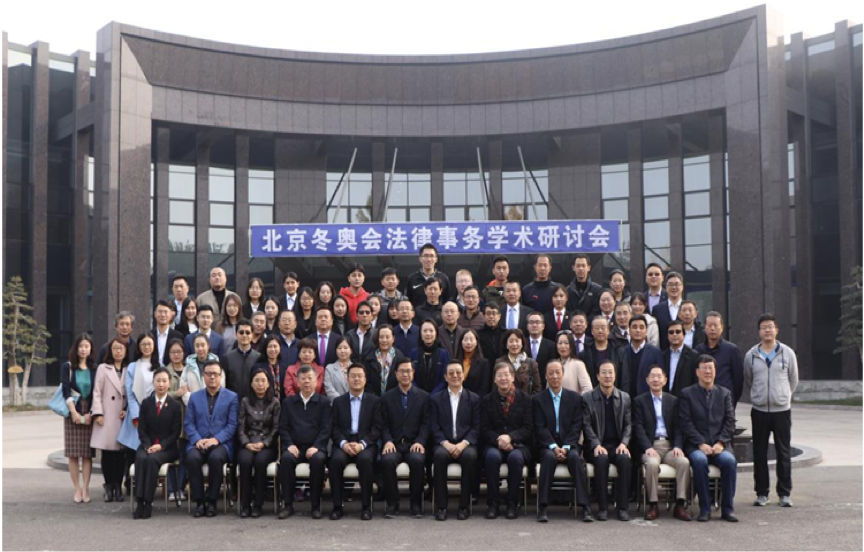Accelerate the Construction of a Strong Sports Country, and Organize High-quality 2022 Beijing Winter Olympics
- Academic Seminar for the Legal Affairs of Beijing Winter Olympics successfully held in Xianghe
On 9 November 2019, the Department of Legal Affairs of Beijing Organizing Committee for the 2022 Olympics, the Editorial Office of Sports Science, the Editorial Office of China Sports Science and Technology, and the Institute for Sports Law of CUPL jointly held the Academic Seminar for the Legal Affairs of Beijing Winter Olympics. The seminar was held at the Xianghe National Football Training Base. Policy and Regulation Department, Sports Science Research Institute and Anti-Stimulant Center of General Administration of Sport of China,, the Department of Legal Affairs of Beijing Organizing Committee for the Winter Olympics, School of Law of CUPL, People's Court of Chongli District in Zhangjiakou, Hebei, China Society Of Studies On Sports Laws, also more than 80 people in theory and practice, and media representatives attended the meeting.
The opening ceremony was hosted by Professor Ma Hongjun, Director of the Institute for Sports Law of CUPL. Li Zhiquan, the first-class inspector and Deputy Director of Policy and Regulation Department of General Administration of Sport of China, pointed out that under the current situation, the Beijing Winter Olympics is the best platform for China to display the new image. It is necessary to transform the functions of the sports administrative department to form a society of sports, where government plays an effective role in market regulation and market supervision. Ma Fuwei, Deputy Director of the Department of Legal Affairs of Beijing Organizing Committee for the Winter Olympics, introduced the preparation works of the Winter Olympics and the key tasks of legal affairs and hoped that everyone would contribute their wisdom and efforts to the legal works of the Beijing Winter Olympics. Qiu Jianrong, Director of the Science and Technology Publication Department of the Sports Science Research Institute of General Administration of Sport of China, proposed to discuss the problems existing in the preparations for the Beijing Winter Olympics through conferences and online or offline exchanges of scholars, to form significant theoretical results. Jiao Hongchang, Dean of the School of Law of CUPL, said that legislation of sports law in China had lagged behind the current state of sports development, and we must accelerate the revision and improvement of the sports law. Before the opening ceremony ended, Li Jingjing, President of the Court of Chongli District, Zhangjiakou City, Hebei, made a special speech entitled The Heart of Sports in a Small Olympic City, to introduce the guaranteed work of law for the Winter Olympics in the judicial field. As for the legal issues related to the Winter Olympics, especially to skiing disputes, President Li raised many problems that need to be solved in trial practice. Liu Yan, President of China Society Of Studies On Sports Laws and former Director of Policy and Regulation Department of General Administration of Sport of China, attended the meeting and hosted the academic seminar.
The first topic of the seminar was about the Olympic Charter and the contract of the Olympic Games . Professor Chen Huarong from the Department of Political Science and Law of Yuncheng University, discussed the legal consequences of applications of moral provision and the resolution mechanism of related disputes, including the role of CAS in solving the disputes over the moral clauses of sports sponsorship contracts. Professor Guo Chunling of Xi'an Physical Education University proposed that the risk control should be carried out in five aspects, including the conclusion of contracts, the content of contracts, the performance and modification of contracts, contractual risk caused by contractual party's reduced ability to perform, and contractual risk caused by differences in legal provisions of various countries. Associate Professor Yuan Gang of the Institute for Sports Law of CUPL, proposed to develop specific rules applicable to China in accordance with the new rules, and to assess the legal risks that may be encountered in response to the characteristics of new media, which we should make corresponding plans. Professor Zhu Wenying, from School of Law, Weifang University, compared the contents of the old rules and the new rules. He believed that it is more feasible to combine the experience of the Chinese Olympic Delegation with foreign experience to formulate relevant documents, for coordinating the conflicts between the IOC, the National Olympic Committee, the sports teams and individual sponsors of athletes.
The second topic was about the International Sports Arbitration Mechanism and the Winter Olympics. Associate Professor Xiang Huiying, from Shanghai University of Political Science and Law, Dr. Zhang Yujiesheng from the School of Law of CUPL, Wu Wei, the partner of Shanghai Llinks Law Firm, and Cai Guo, the lawyer of Jin Mao Law Firm have made the speeches. The third topic was about legal issues in anti-stimulant work. Professor Han Yong, from the Capital University of Physical Education and Sports, Professor Li Zhi, from School of Law of Fuzhou University, Professor Huang Shichang ,from the Research Center for Sports Law of Xiangtan University, Associate Professor Xiong Yingzi ,from the School of Physical Education, Soochow University, and Luan Zhaoqian, from Anti-Stimulant Center of General Administration of Sport of China have made their speeches.
The closing ceremony was hosted by Professor Wang Xiaoping. Professor Ma Hongjun made a summary of the seminar. He said that the seminar analyzed various problems encountered in the actual work of the sports law, which provided some samples from various angles for the Beijing Winter Olympics. The seminar made a unique contribution to the 2022 Beijing Winter Olympics, and strengthened the construction of China's sports law, as well as promoted the construction of a strong sports country.
